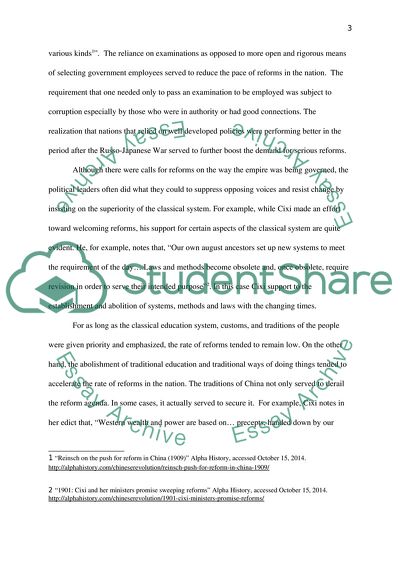Cite this document
(Late Imperial China: Effects of Intellectual and Historical Traditions Report Example | Topics and Well Written Essays - 1500 words, n.d.)
Late Imperial China: Effects of Intellectual and Historical Traditions Report Example | Topics and Well Written Essays - 1500 words. https://studentshare.org/history/1841795-how-and-why-did-competing-intellectual-and-historical-traditions-affect-the-nature-and-pace-of-reform-in-late-imperial-china
Late Imperial China: Effects of Intellectual and Historical Traditions Report Example | Topics and Well Written Essays - 1500 words. https://studentshare.org/history/1841795-how-and-why-did-competing-intellectual-and-historical-traditions-affect-the-nature-and-pace-of-reform-in-late-imperial-china
(Late Imperial China: Effects of Intellectual and Historical Traditions Report Example | Topics and Well Written Essays - 1500 Words)
Late Imperial China: Effects of Intellectual and Historical Traditions Report Example | Topics and Well Written Essays - 1500 Words. https://studentshare.org/history/1841795-how-and-why-did-competing-intellectual-and-historical-traditions-affect-the-nature-and-pace-of-reform-in-late-imperial-china.
Late Imperial China: Effects of Intellectual and Historical Traditions Report Example | Topics and Well Written Essays - 1500 Words. https://studentshare.org/history/1841795-how-and-why-did-competing-intellectual-and-historical-traditions-affect-the-nature-and-pace-of-reform-in-late-imperial-china.
“Late Imperial China: Effects of Intellectual and Historical Traditions Report Example | Topics and Well Written Essays - 1500 Words”. https://studentshare.org/history/1841795-how-and-why-did-competing-intellectual-and-historical-traditions-affect-the-nature-and-pace-of-reform-in-late-imperial-china.


